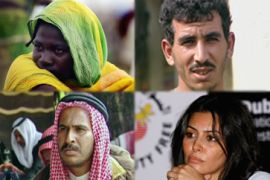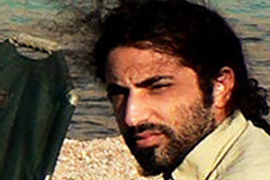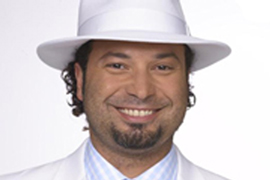What makes an Arab?
Arabs from across the world reflect on what defines their identity.

|
|
 |
| Kamel: I would have been happier to identify myself as human |
Omar Kamel, 36, musician, author and video producer – Egyptian
“Well, I speak Arabic. And as for identifying myself, it depends who I’m speaking to, and when.
Years ago, I would have been happier to just identify myself as human.
When I first came to Egypt, I didn’t consider myself Egyptian, Arab or otherwise.
However, over the years, and especially with mounting anti-Arabism, it’s become easier to adopt the identity.”
Abdelouadoud El Omrani, 52, translation expert – Tunisian
“Yes, absolutely, I identify myself as an Arab. And the first reason is the language Arabs speak, of course: Arabic. It is the common feature among Arabs – the language which Arabs use to communicate with one another.
It cannot be stressed enough how vital communication is – to be able to communicate with one another, within our community. Arabic carries with it a set of cultural values which I happen to share with other Arabs.
Another aspect which makes me feel Arab is our contemporary socio-political situation in the Arab world. What is happening in Iraq, what is happening in Palestine – these things affect me directly. The suffering of these peoples is my suffering as well. We share a communion, a brotherhood with one another.
There is a patriotic connection Arabs feel for each other. It is pan-Arab.”
 |
| Kevorkian-Papouras: ‘Arabness’ is only one portion of my identity |
Maro Kevorkian-Papouras, 26, project manager and writer – Palestinian Armenian
“What most defines me as an Arab are culture and traditions. As a half-Palestinian, half-Armenian, who grew up in an Israeli-Palestinian environment and currently an American environment, my identity is a construct of all of these cultures and nationalities.
Therefore, I do not necessarily identify myself as an ‘Arab’, because my ‘Arabness’ is only one portion of my identity, as I have many facets of my identity that are not necessarily considered ‘Arab’.
I would rather identify myself as a Palestinian than an Arab, as I believe that ‘being Arab’ is too general and marginalises the uniqueness of each nation that is considered ‘Arab’.
There are various religions, minority groups, political views and individualities that get sidelined when Arabs are generalised.”
Khaled Bahaaeldin, 37, surgeon – Egyptian
“I believe that Arab identity is the product of a historical interaction among people sharing a geographically unpartitioned area.
This interaction comprises theological, cultural, linguistic and political components, each of which takes precedence in a particular historical era. But I have to stress that the ‘intra-actions’ between Arabs have never been due to a singular component.
Indeed, the Arab inhabitants of the Middle East, despite the obvious chauvinisms, could claim communality with each other.”
George Khoury, 65, retired engineer – Palestinian
“I was born and raised in Jerusalem, Palestine, before Israel was established. I have been in the United States for the last 47 years. I do not feel that I am an American. I am living within the laws of the land, written and unwritten.
My feeling, however, is that I belong to a different group of people, Arabic people. If you combine traditions, heritage, culture and values in one personality-forming mechanism, that mechanism defines me as an Arab.
Language is strong, but I never felt that it is what binds me to Arabism. I appreciate the beauty of the Arabic language, prose and poetry, but I also appreciate the English language in both forms – prose and poetry. Therefore, if I were deaf and speechless, I will still be an Arab.
What my parents instilled in me of values, heritage and culture, especially at a very early age, defined my personality and, thus, my Arabism.
Arabs have a glorious history immediately after Islam that went on to the end of the first Abbasid era. After that, it is not a history that anybody wants to identify with. That is because it was, and is, filled with weakness, defeats, submissions, divisions and discrimination. Look at what is happening this very day.
The Israelis and Americans are massacring the Palestinians and the Arab governments, including the Palestinian Authority, are watching the tragedy unfold. This is the present that is going to be history tomorrow that you do not want to be identified with.”
 |
| Ahmed: I tend to talk with my hands |
Ahmed Ahmed, 37, comedian – Egyptian
“What defines me as an Arab? I was born in Egypt, in a 100 per cent Egyptian family. I was raised in America, but in a very traditional Arab household where the food, culture, music and language were always present.
Like most immigrant families, my family’s values are strong and heritage is extremely important. What makes me an Arab? I tend to talk with my hands a lot and I also have attention deficit disorder.
I don’t want to forget that my American side is just as strong if not stronger than my Arab side. Living in Hollywood, California, I am blessed to have the best of both worlds.
As a stand up comedian it enables me to draw from both cultures and experiences that provide great comedy fodder.”
Ahmad Hallak, 31, investment portfolio manager – Jordanian
“Although I am a Palestinian Muslim and very proud of it, I have always felt that my cultural identity is defined by being Arabic. It’s important to note that being Arabic has absolutely no racial implications; prior to the advent of Islam, the peoples of Egypt, the Levant and North Africa, among other nations, were not Arabic.
The fact that the overwhelming majority of peoples within these regions now describe themselves as Arabs is due mainly to a shared heritage.
What does it mean to me to be an Arab? As a person who believes that nationalism is a crude, shallow and valueless ideology, it means nothing more to me than as a shared and collective cultural identity which can help unite a fragmented and disillusioned region which has lost its way. Beyond that, it serves no higher purpose to dwell on.
How can one aspire to have a society where different cultural values, traditions and norms are respected and accepted in a nation where a rigid and ‘artificial national identity’ is imposed by the ‘current’ majority?
The fact is that even Arab nations may, one day, be subject to the demographic changes which are making obsolete, the old imperial national identities of European nations.
The only feasible alternative for a modern, enlightened nation is to have an unchanging set of common values and rights which are legally enshrined but which do not touch on the troubled and divisive issue of national identity.”
 |
| Alhamad: We all suffer oppression |
Rami Alhamad, 21, university student – Syrian
“Even though I have lived in Canada for the past eight years, I still completely identify with my Arab identity.
What defines me as an Arab is not complexion, or any other physical feature, but my belief that the shared history and common struggles across the Middle East unite us.
People tend to be cynical nowadays of being Arab and avoid identifying with that term but, regardless of the current situation we find ourselves in, we have to admit that we all suffer from very similar problems – from economic and social oppression to political oppression. I can say that because I am here in Canada now, but I guess I know it’s generally felt around the Middle East.
The United States, for example, has very different states within its union. People from Texas might never get along with people from New York or LA, but they still hold the belief in American unity on one level or another. I don’t see how the Arab world is any different.
From a historical perspective, our governments have mostly worked against Arab unity, regardless of what they said in their glorified rants labelled as speeches.
The West and the Cold war didn’t help either. But regardless, as long as the Arabic language survives, I am confident that when the right economic and political atmosphere is present, unity will prevail, if not in concrete terms then through a similar setup to the European Union.”
 |
| Farhat: There are vast differences among each country |
Nassib Farhat, 28, project manager, construction industry – Lebanese
“As a Lebanese American, I believe an Arab is a person whose native language is Arabic, and has lived or is living in an Arabic-speaking country.
I don’t think culture, traditions, or values necessarily contribute to one being an Arab due to the vast difference between Arab cultures.
Compare Lebanon to Saudi Arabia, and then Morocco.
There are vast differences among each country in the way they speak, the way they govern their people and land and even the foods they eat.”
Joseph Haddad, 24, business owner – Jordanian
“Although the term Arab is a cultural and linguistic definition and not a racial one, it is easy to label a person ‘Arab’ because they want to be labelled as an ‘Arab’.
I first see myself as Jordanian American, because it is both these countries that have influenced my way of life.
There is a false perception that if all Arab countries united as a whole, they could form a mighty union. Different Arab countries have different ways of practicing their cultures. While we all speak the Arabic language, this does not unite us. Even our language differs in dialect from country to country.”
 |
| Tamam: I do not allow anyone to belittle Arabs |
Esmat Tamam, 20, student – Egyptian
“I identify myself as an Arab first and foremost. There are many things that can identify one as an Arab, but the most important factor is our language.
The Arabic language gives me a sense of direction – where I am from and where I am going.
I do not allow anybody to belittle Arabs whether it is in their actions or speech.
It is this position that I hold which ascertains I am an Arab.”
Qais Raji, 40, cigarette seller – Iraqi
“Arabs are people who speak Arabic and the ones who keep the Arabic culture and traditions.
In Iraq, many groups don’t consider themselves Arabs. Kurds and followers of Iran deem themselves from anther origin although they live in our country and speak Arabic.
I believe myself to be an Arab not only because I speak Arabic, but for the reason that I follow culture and traditions like meals from our vast cuisines, marriage in accordance with our customs, wear costumes as an Arab does.”
